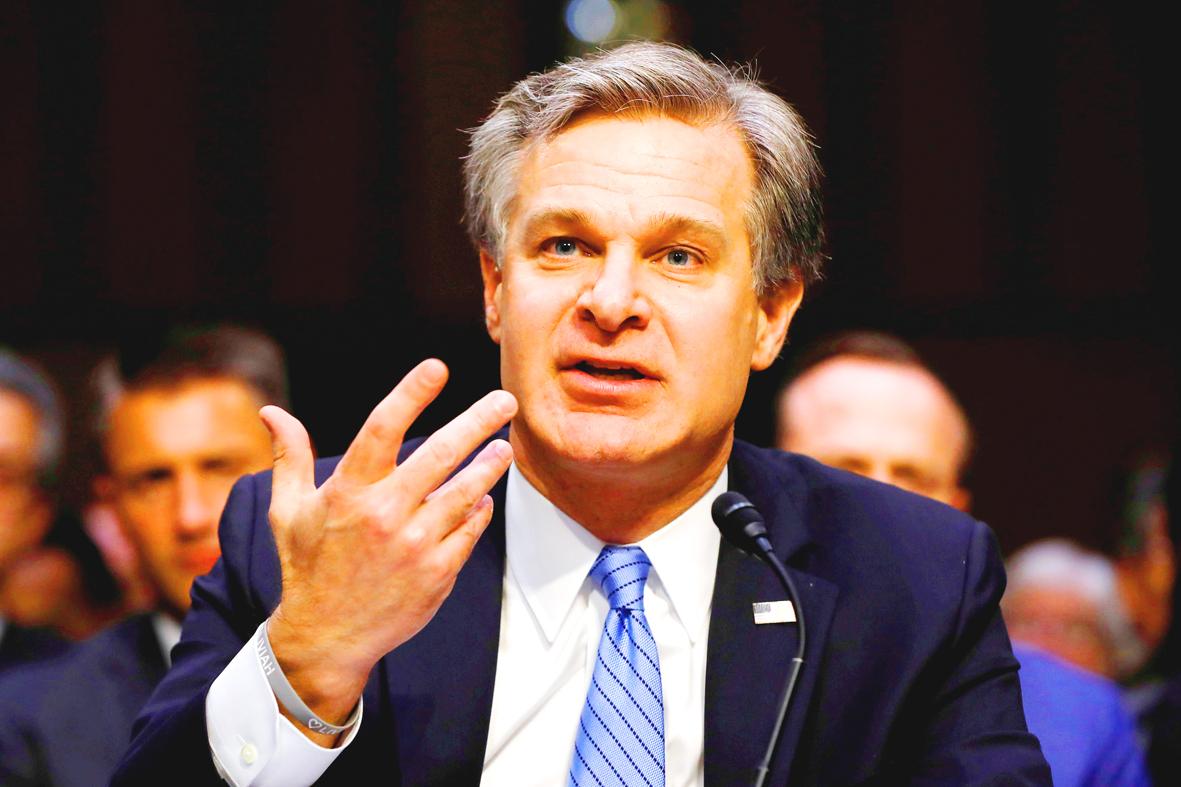The Ministry of Foreign Affairs yesterday strongly condemned the Chinese government for meddling with US officials’ interactions with Taiwan after FBI Director Christopher Wray revealed China’s efforts to discourage US officials from visiting Taiwan.
The greatest long-term threat to the US’ information security and intellectual property, as well as its economic vitality, is China’s counterintelligence and economic espionage operations, Wray told a video event at the Hudson Institute in Washington.
Beijing is engaged in a highly sophisticated and maligning foreign influence campaign, with methods that include bribery, blackmail and covert deals, he said.

Photo: Reuters
Giving an example, Wray said that when a US official plans to visit Taiwan, China would hit back at a company from the official’s home state by withholding licenses to manufacture products in China.
In more covert ways, China would approach people close to the official to act on its behalf as intermediaries to influence the official, he said, adding that some of the intermediaries might not even realize that they are being used as pawns.
The Chinese Communist Party also pressures US media and sports giants to ignore or suppress criticism of China’s ambitions regarding Taiwan or Hong Kong, he said.
The FBI opens a new China-related counterintelligence case about every 10 hours, Wray said, adding that of the nearly 5,000 active FBI counterintelligence cases under way across the US, almost half are related to China.
To protect the US’ economy, data, academia and innovation, the FBI is using a broad set of techniques ranging from traditional law enforcement to intelligence capabilities, he said, adding that it is working more closely with partner agencies at home and abroad to investigate China’s crimes.
Asked for comment, ministry spokeswoman Joanne Ou (歐江安) said the ministry strongly condemns Beijing’s ill-natured intervention in foreign governments’ interactions with Taiwan.
China has used every possible means to suppress Taiwan and its friends on the global stage, which does not benefit cross-strait relations and intensifies Taiwanese dislike of China, she said.
Taiwan’s achievements in democracy, freedom, human rights and the rule of law have won global acclaim, a fact that Beijing cannot suppress, she added.
The ministry calls on the global community to face China’s intention to subdue Taiwan and show the moral courage to reject its irrational requests, Ou said.
The issues of Taiwan, Hong Kong, Xinjiang and Tibet are pertinent to China’s sovereignty and security, for which China does not allow any foreign intervention, Chinese Vice Minister of Foreign Affairs Le Yucheng (樂玉成) said at a video forum cohosted by the Chinese People’s Institute of Foreign Affairs and the Asia Society of the US.
While the US talks about market economy and fair competition, it actually does not allow other countries to become better or more competitive than itself, he added.
Regarding the future of China-US relations, Le said that while bilateral relations are heavily clouded, the sun always rises, and it is an unstoppable trend that the two nations will finally cooperate.

The Central Election Commission has amended election and recall regulations to require elected office candidates to provide proof that they have no Chinese citizenship, a Cabinet report said. The commission on Oct. 29 last year revised the Measures for the Permission of Family-based Residence, Long-term Residence and Settlement of People from the Mainland Area in the Taiwan Area (大陸地區人民在台灣地區依親居留長期居留或定居許可辦法), the Executive Yuan said in a report it submitted to the legislature for review. The revision requires Chinese citizens applying for permanent residency to submit notarial documents showing that they have lost their Chinese household record and have renounced — or have never

A magnitude 5.6 earthquake struck off the coast of Yilan County at 12:37pm today, with clear shaking felt across much of northern Taiwan. There were no immediate reports of damage. The epicenter of the quake was 16.9km east-southeast of Yilan County Hall offshore at a depth of 66.8km, Central Weather Administration (CWA) data showed. The maximum intensity registered at a 4 in Yilan County’s Nanao Township (南澳) on Taiwan’s seven-tier scale. Other parts of Yilan, as well as certain areas of Hualien County, Taipei, New Taipei City, Taoyuan, Hsinchu County, Taichung and Miaoli County, recorded intensities of 3. Residents of Yilan County and Taipei received

Taiwan has secured another breakthrough in fruit exports, with jujubes, dragon fruit and lychees approved for shipment to the EU, the Ministry of Agriculture said yesterday. The Animal and Plant Health Inspection Agency on Thursday received formal notification of the approval from the EU, the ministry said, adding that the decision was expected to expand Taiwanese fruit producers’ access to high-end European markets. Taiwan exported 126 tonnes of lychees last year, valued at US$1.48 million, with Japan accounting for 102 tonnes. Other export destinations included New Zealand, Hong Kong, the US and Australia, ministry data showed. Jujube exports totaled 103 tonnes, valued at

BIG SPENDERS: Foreign investors bought the most Taiwan equities since 2005, signaling confidence that an AI boom would continue to benefit chipmakers Taiwan Semiconductor Manufacturing Co’s (TSMC, 台積電) market capitalization swelled to US$2 trillion for the first time following a 4.25 percent rally in its American depositary receipts (ADR) overnight, putting the world’s biggest contract chipmaker sixth on the list of the world’s biggest companies by market capitalization, just behind Amazon.com Inc. The site CompaniesMarketcap.com ranked TSMC ahead of Saudi Aramco and Meta Platforms Inc. The Taiwanese company’s ADRs on Tuesday surged to US$385.75 on the New York Stock Exchange, as strong demand for artificial intelligence (AI) applications led to chip supply constraints and boost revenue growth to record-breaking levels. Each TSMC ADR represents